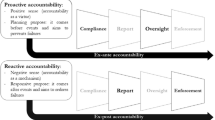Abstract
In H-C interaction, computer supported cooperation andorganisation, computer mediated commerce, intelligentdata bases, teams of robots. etc. there will bepurposively deceiving computers. In particular, withinthe Agent-based paradigm we will have ``deceivingagents''. Several kinds of deception will be present ininteraction with the user, or among people viacomputer, or among artificial agents not only formalicious reasons (war, commerce, fraud, etc.) butalso for goodwill and in our interest. Social control,trust, and moral aspects in artificial societies willbe the focus of theoretical worm as well as ofimplementation. Is there any special affinity betweenAI and deception?
Similar content being viewed by others
References
H. Arkes and C. Blumer. The Psychology of Sunk Cost. Organizational Behaviour and Human Decision Process, 35: 124–140, 1985.
K. Binmore, C. Castelfranchi, J. Doran and M. Wooldridge. Rationality in Multi-Agent Systems. The Knowledge Engineering Review, 13(3): 309–314, 1998.
D. Bobrow. Dimensions of Interaction. AI Magazine, 12(3): 64–80, 1991.
C. Castelfranchi. Social Commitment: from Individual Intentions to Groups and Organizations. First International Conference on Multi-Agent Systems. AAAI Press, S. Francisco, CA, 1995.
C. Castelfranchi. Modelling Social Action for AI Agents. Artificial Intelligence, 6: 1998.
C. Castelfranchi, F. Dignum, C. Jonker and J. Treur. Deliberate Normative Agents: Principles and Architecture. ATAL'99. Boston, 1999.
C. Castelfranchi and R. Falcone. Principles of Trust for Multi-Agent Systems: Cognitive Anatomy, Social Importance, and Quantification. International Conferences on MAS-ICMAS'98, 2–8 July. AAAI-MIT Press, Paris, 1998.
C. Castelfranchi, R. Falcone and F. de Rosis. Deceiving in GOLEM: How to Strategically Pilfer Help. In C. Castelfranchi and Y.H. Tan, editors (in press).
C. Castelfranchi and I. Poggi. Per una scienza dell'inganno (Towards the Science of Deception). Carocci, Roma, 1999.
C. Castelfranchi and Y.H. Tan, editors, Trust, Deception and Fraud in Artificial Societies. Kluwer (in press).
R. Conte and C. Castelfranchi. Cognitive and Social Action. UCL Press, London, 1995a.
R. Conte and C. Castelfranchi. (1995b) Norms as Mental Objects. From Normative Beliefs to Normative Goals. In C. Castelfranchi and J.P. Muller, editors, From Reaction to Cognition, pp. 186–199. Springer Verlag, Berlin.
R. Conte and C. Castelfranchi. From Conventions to Prescriptions. Towards a Unified Theory of Norms. AI and Law, 3: 1998.
F. de Rosis, F. Grasso and D. Berry. Refining Medical Explanation Generation after Evaluation. Artificial Intelligence in Medicine (2000).
Doran. Simulating Collective Misbeliefs. JASSS, I: 1, 1998.
Falcone and B. Firozabadi. The Challenge of Trust, The Autonomous Agents '98 Workshop on Deception, Fraud and Trust in Agent Societies. The Knowledge Engineering Review, 14: 1, 1999.
A. Hartmann. Comprehensive Information Technology Security: A New Approach to Respond Ethical and Social Issues Surrounding Information Security in the 21st Century. In IFIP TCI 11 Intern. Conf. of Information Security, 1995.
L.M. Hogg and N.R. Jennings. Socially Rational Agents. In Proc. AAAI Fallsymposium on Socially Intelligent Agents, pp. 61–63. Boston, MA, November 8–10, 1997.
J. Leiwo and S. Heikkuri. An Analysis of Ethics Foundations of Information Security in Distributed Systems, TR. Nokia TeleC, Helsinki, 1996.
G. O'Hare and N.R. Jennings, editors. Foundations of Distributed AI. John Wiley & Sons, 1996.
R. Picard. Affective Computing. MIT Press, Boston, 1996.
T. Rea. Engendering Trust in Electronic Environments. Roles for a Trusted Third Party. In C. Castelfranchi and Y.H. Tan, editors (in press).
E. Rocco and M. Warglien. Computer Mediated Communication and the Emergence of “Electronic Opportunism. WP 1996–01, Univ di Trento, 1996.
J.S. Rosenschein and G. Zlotkin. Rules of Encounters Designing Conventions for Automated Negotiation among Computers. MIT Press, Cambridge, MA, 1994.
S.J. Russel and P. Norvig. Artificial Intelligence, A Modern Approach. Prentice Hall International, 1995.
A.M. Turing. Computing Machinery and intelligence, 1950.
N. Vulkan, N. Economic Implications of Agent Technology and Commerce. The Economic Journal (Febrary), 1999.
G. Wagner. Multi-Level Security in Multiagent Systems. In P. Kandzia and M. Klusch, editors, Cooperative Information Agents, pp. 272–285. Springer LNAI 1202, 1997.
K. Witte. The Manipulative Nature of Health Communication Research. Ethical Issues and Guidelines. American Behavioral Scientist, 38(2): 285–293, 1994.
M.J. Wooldridge. Agent-Based Software Engineering. IEE Proc Software Engineering, 144: 26–37, 1997.



